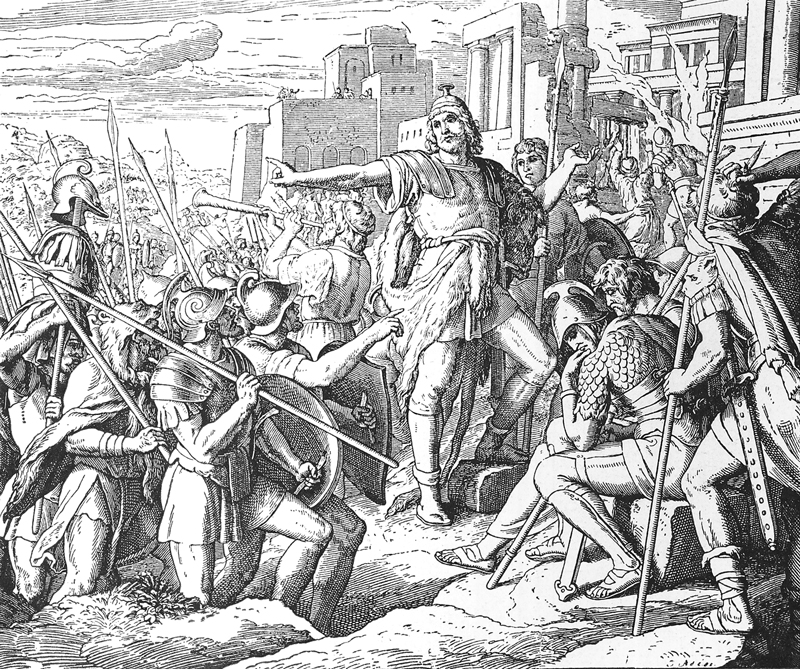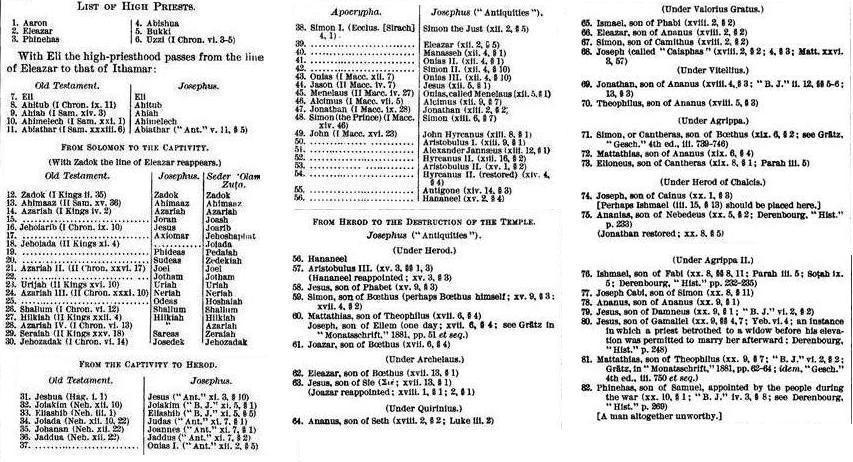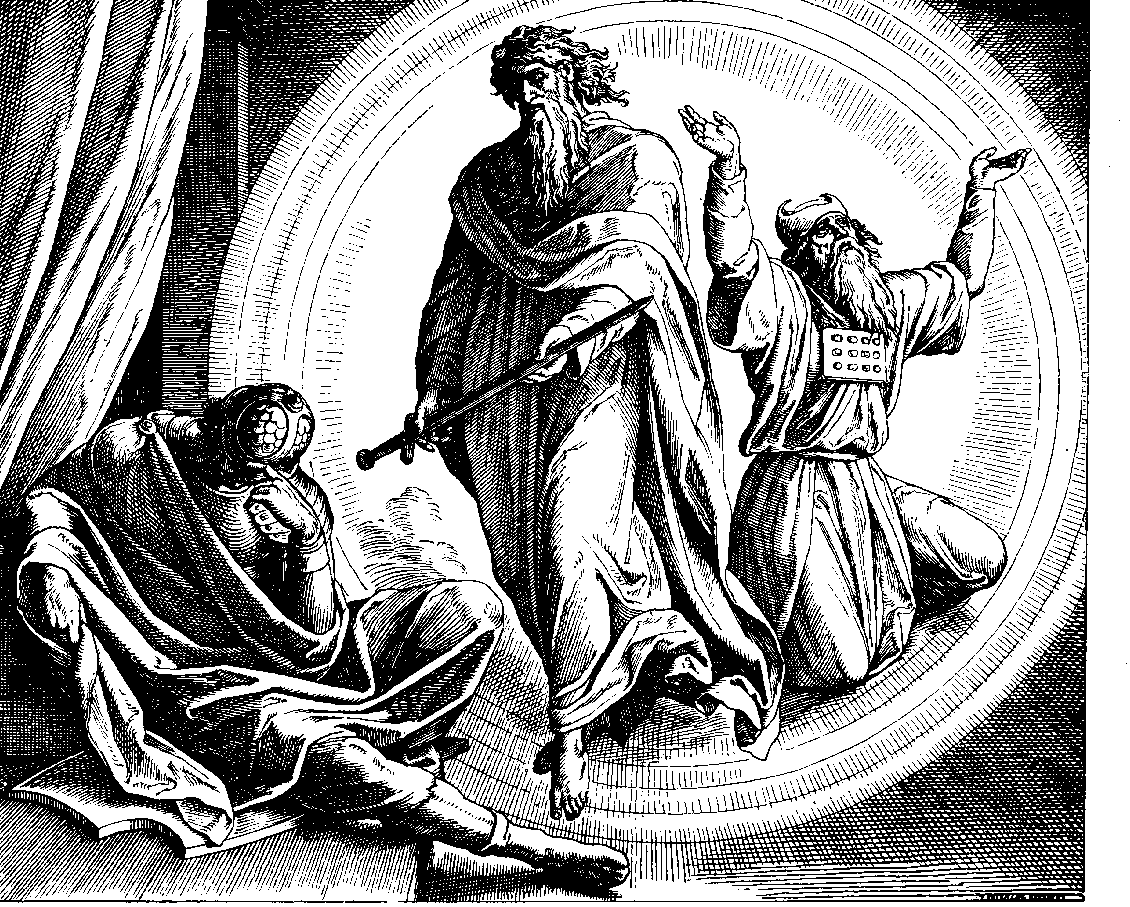|
Alcimus
Alcimus (from grc-gre, Ἄλκιμος ''Alkimos'', "valiant" or Hebrew אליקום ''Elyaqum'', "God will rise"), also called Jakeimos, Jacimus, or Joachim (), was High Priest of Israel for three years from 162–159 BCE. He was a moderate Hellenizer who favored the ruling government of the Seleucid Empire (Greek Syria) and opposed the Maccabean Revolt which was in progress at the time. Original sources What is known of Alcimus comes from records found in 1 Maccabees (, ); 2 Maccabees (); and Josephus's '' Antiquities of the Jews'' Book 12, Chapters 9-11. All of these sources are hostile to Alcimus; no sources from his faction's perspective survived. Alcimus is described as a leader of the Hellenizing faction of Hellenistic Judaism that favored more enthusiastic adoption of Greek practices and less adherence to Jewish law. Biography The office of high priest was recently vacant in 163 BCE after despised High Priest Menelaus was executed by Regent Lysias. It is not clear ... [...More Info...] [...Related Items...] OR: [Wikipedia] [Google] [Baidu] |
Maccabean Revolt
The Maccabean Revolt ( he, מרד החשמונאים) was a Jewish rebellion led by the Maccabees against the Seleucid Empire and against Hellenistic influence on Jewish life. The main phase of the revolt lasted from 167–160 BCE and ended with the Seleucids in control of Judea, but conflict between the Maccabees, Hellenized Jews, and the Seleucids continued until 134 BCE, with the Maccabees eventually attaining independence. Seleucid King Antiochus IV Epiphanes launched a massive campaign of repression against the Jewish religion in 168 BCE. The reason he did so is not entirely clear, but it seems to have been related to the King mistaking an internal conflict among the Jewish priesthood as a full-scale rebellion. Jewish practices were banned, Jerusalem was placed under direct Seleucid control, and the Second Temple in Jerusalem was made the site of a syncretic Pagan-Jewish cult. This repression triggered exactly the revolt that Antiochus IV had feared, with a group o ... [...More Info...] [...Related Items...] OR: [Wikipedia] [Google] [Baidu] |
Judas Maccabeus
Judah Maccabee (or Judas Maccabeus, also spelled Machabeus, or Maccabæus, Hebrew: יהודה המכבי, ''Yehudah HaMakabi'') was a Jewish priest (''kohen'') and a son of the priest Mattathias. He led the Maccabean Revolt against the Seleucid Empire (167–160 BCE). The Jewish holiday of Hanukkah ("Dedication") commemorates the restoration of Jewish worship at the Second Temple in Jerusalem in 164 BCE, after Judah Maccabee removed all of the statues depicting Greek gods and goddesses and purified it. Life Early life Judah was the third son of Mattathias the Hasmonean, a Jewish priest from the village of Modi'in. In 167 BCE Mattathias, together with his sons Judah, Eleazar, Simon, John, and Jonathan, started a revolt against the Seleucid ruler Antiochus IV Epiphanes, who since 175 BCE had issued decrees that forbade Jewish religious practices. After Mattathias's death in 166 BCE, Judah assumed leadership of the revolt in accordance with the deathbed disposition of his ... [...More Info...] [...Related Items...] OR: [Wikipedia] [Google] [Baidu] |
Hasideans
The Hasideans ( he, חסידים הראשונים, ''Hasidim ha-Rishonim'', Greek ''Ἀσιδαῖοι'' or Asidaioi, also transcribed Hasidæans, Assideans, Hassideans or Assideans) were a Jewish religious party which played an important role in political life only during the time of the Maccabean wars, although it had existed for quite some time previous. The Hasideans are mentioned only three times in the books of the Maccabees. As a result, they have been the object of much scholarly speculation. Opinions are divided as to whether the Hasideans were the predecessors of the Pharisees, the Essenes or both.Henriques, James Connell. "The Identity of the Hasideans of 1 and 2 Maccabees: A Re-examination of the Topic with a Focus on the History of Scholarship." PhD diss., University of Georgia, 2009. The term Hasid The Hebrew word ''hasid'', meaning "pious", was a natural title for pious individuals in every generation. The name "Hasidim" occurs frequently in Psalms in the sense ... [...More Info...] [...Related Items...] OR: [Wikipedia] [Google] [Baidu] |
Jose Ben Joezer
Jose ben Joezer (also spelt Yose ben Yoezer) was a rabbi of the early Maccabean period, possibly a disciple of Antigonus of Soko and member of the ascetic group known as the Hasidæans, though neither is certain. He belonged to a priestly family. Biography With him and Jose ben Johanan of Jerusalem, his colleague, begins the period known in Jewish history as that of the zugot (duumvirate), which ended with Hillel and Shammai. According to an old tradition, the member of the "zugot" mentioned first occupied the office of Nasi (president) of the Sanhedrin, while the one mentioned second served in the capacity of vice-president. Jose belonged to the party of the Ḥasidim, and was a decided adversary of Hellenism. To prevent Jews from settling beyond Judea he declared all pagan countries " unclean". He declared also glass utensils "unclean", probably because they were manufactured in pagan countries. In other respects, however, he was very liberal, and received the surname "Sharaya" ... [...More Info...] [...Related Items...] OR: [Wikipedia] [Google] [Baidu] |
List Of High Priests Of Israel
This article gives a list of the High Priests (''Kohen Gadol'') of Ancient Israel up to the destruction of the Second Temple in 70 AD. Because of a lack of historical data, this list is incomplete and there may be gaps. High Priests of Israel The High Priests, like all Levitical priests, belonged to the Aaronic line. The Bible mentions the majority of high priests before the Babylonian captivity, but does not give a complete list of office holders. Lists would be based on various historical sources. In several periods of gentile rule, high priests were appointed and removed by kings. Still, most high priests came from the Aaronic line. One exception is Menelaus, who may not have been from the Tribe of Levi at all, but from the Tribe of Benjamin. From the Exodus to Solomon's Temple The following section is based on information found in the various books of the Bible, including the genealogies given in First Book of Chronicles and the Book of Ezra, the works of Josephus and ... [...More Info...] [...Related Items...] OR: [Wikipedia] [Google] [Baidu] |
Bacchides (general)
Bacchides ( el, Βακχίδης) was a Hellenistic Greek general; friend of the Syrian-Greek king Demetrius; and "ruler in the country beyond the river"—Euphrates. Demetrius sent him in 161 BCE to Judea with a large army, in order to invest Alcimus with the office of High Priest of Israel (''I Macc.'' vii. 8, 9). The peaceable Assideans credulously expected friendship from him; but, contrary to oath and covenant, he cruelly slew sixty of them (ib. vii. 16). Leaving Jerusalem, he made a slaughter-house of Bezeth (Bethzecha), and after handing the country over to Alcimus, returned to the king (ib. vii. 19, 20). Demetrius sent Bacchides back to Judea. A Greek army, under General Nicanor, had been defeated by Judas Maccabeus (ib. vii. 26–50) at the Battle of Adasa. Nicanor had been killed near Adasa. Bacchides was sent with Alcimus and an army of twenty thousand infantry and two thousand cavalry. Bacchides met Judas at The Battle of Elasa (Laisa). Judas was killed and his a ... [...More Info...] [...Related Items...] OR: [Wikipedia] [Google] [Baidu] |
Nicanor (Syrian General)
Nicanor (; el, Nικάνωρ ''Nīkā́nōr''; died 161 BC) was a Syrian-Seleucid General under the kings Antiochus Epiphanes and Demetrius Soter. Early military career The son of Patroclus and one of the king's "chief friends" ( 2 Macc 8:9), After the defeat of Seron by Judas Maccabeus at the Battle of Beth Horon, Epiphanes entrusted his chancellor Lysias with the destruction of Judea ( 1 Macc 3:34). Nicanor was one of the three generals commissioned by Lysias; the others being Ptolemy, son of Dorymenes, and Gorgias (1 Macc 3:38). The campaign began in 166 BC; the Syrians were defeated at Emmaus (1 Macc 3:57), while Gorgias at a later stage gained a victory at Jamnia over a group of Jews who disobeyed Judas Maccabeus (1 Macc 5:58). The account given in 2 Maccabees differs considerably, both in omissions and in additions (2 Macc 8:9). There Nicanor, not Gorgias, is the chief in command. The battle of Emmaus is not mentioned, but "the thrice-accursed Nicanor," having in overwee ... [...More Info...] [...Related Items...] OR: [Wikipedia] [Google] [Baidu] |
2 Maccabees
2 Maccabees, el, Μακκαβαίων Β´, translit=Makkabaíōn 2 also known as the Second Book of Maccabees, Second Maccabees, and abbreviated as 2 Macc., is a deuterocanonical book which recounts the persecution of Jews under King Antiochus IV Epiphanes and the Maccabean Revolt against him. It concludes with the defeat of the Seleucid Empire general Nicanor in 161 BC by Judas Maccabeus, the leader of the Maccabees. 2 Maccabees was originally written in Koine Greek by an unknown diaspora Jew living in Hellenistic Egypt. It was likely written some time between 150 and 120 BC. Together with the book 1 Maccabees, it is one of the most important sources on the Maccabean Revolt. The work is not a sequel to 1 Maccabees but rather its own independent rendition of the historical events of the Maccabean Revolt. It both starts and ends its history earlier than 1 Maccabees, starting with an incident with the Seleucid official Heliodorus attempting to tax the Second Temple in 178 B ... [...More Info...] [...Related Items...] OR: [Wikipedia] [Google] [Baidu] |
Demetrius I Soter
Demetrius I (Greek: ''Δημήτριος Α`'', 185 – June 150 BC), surnamed Soter (Greek: ''Σωτήρ'' - "Savior"), reigned as king (basileus) of the Hellenistic Seleucid Empire from November 162 – June 150 BC. Demetrius grew up in Rome as a hostage, but returned to Greek Syria and overthrew his young cousin Antiochus V Eupator and regent Lysias. Demetrius took control during a turbulent time of the Empire, and spent much of his time fighting off revolts and challenges to his power from threats such as Timarchus and Alexander Balas. Biography Early confinement and escape Demetrius was born around 185 BC. He was sent to Rome as a hostage at a young age during the reign of his father Seleucus IV Philopator and his mother Laodice IV.Appian, ''Roman History: Syrian Wars'' 8.46 Rome taking prominent Seleucid family members hostage was one of the terms of the Treaty of Apamea that had ended the Roman-Seleucid War. His father was likely murdered by his finance minister Heliod ... [...More Info...] [...Related Items...] OR: [Wikipedia] [Google] [Baidu] |
1 Maccabees
The First Book of Maccabees, also known as First Maccabees (written in shorthand as 1 Maccabees or 1 Macc.), is a book written in Hebrew by an anonymousRappaport, U., ''47. 1 Maccabees'' in Barton, J. and Muddiman, J. (2001)The Oxford Bible Commentary, p. 711 Jewish author after the restoration of an independent Jewish kingdom by the Hasmonean dynasty, around the late 2nd century BC. The original Hebrew is lost and the most important surviving version is the Greek translation contained in the Septuagint. The book is held as canonical scripture by the Catholic, Orthodox, and Oriental Orthodox churches (except for the Orthodox Tewahedo), but not by Protestant denominations nor any major branches of Judaism; it is not part of the Hebrew Bible. Some Protestants consider it to be an apocryphal book (see also Deuterocanonical books). 1 Maccabees is best known for its account of an early victory in the Maccabean Revolt against the Seleucid Empire: the recapture of Jerusalem in the year ... [...More Info...] [...Related Items...] OR: [Wikipedia] [Google] [Baidu] |
Menelaus (High Priest)
Menelaus ( he, מנלאוס) was High Priest in Jerusalem from about 172 BC to about 161 BC. He was high priest at the beginning of the Maccabean revolt (167-160). He was the successor of Jason, the brother of Onias III. The sources are divided as to his origin. According to II Maccabees, he belonged to the Tribe of Benjamin and was the brother of the Simeon who had denounced Onias III to Seleucus IV Philopator, and revealed to the Syrians the existence of the treasure of the Temple; according to Flavius Josephus, Menelaus was the brother of Onias III and Jason, his two predecessors as High Priest, and also bore the name Onias. It is possible that Josephus confused Simeon, the brother of Menelaus, with Simeon, the father of Onias and Jason. Hellenizing tendencies Although during the three years of his pontificate Jason had given many proofs of his attachment to the Hellenistic party (by building a gymnasium in Jerusalem and by introducing many Greek customs) the Hellenists of the ... [...More Info...] [...Related Items...] OR: [Wikipedia] [Google] [Baidu] |
Lysias (Syrian Chancellor)
Lysias (; el, Λυσίας; he, ליזיאש; died 162 BCE) was a 2nd-century BCE general and governor of Syria under the Seleucid Empire. Biography He was described as, "A noble man, and one of the blood royal". The Seleucid Empire of the era was huge; it possessed two heartlands, the capital at Antioch and Syria, and a secondary capital in Babylon and Mesopotamia. Seleucid rulers had to aggressively remind their client rulers of their loyalty lest the client rulers drift towards independence, as happened with various subkingdoms over time. King Antiochus IV Epiphanes left Antioch circa 166 or 165 BCE on an expedition to the eastern satrapies; he would see to affairs in Babylonia, dismiss corrupt or overly independent officials, and attempt to exercise control over the drifting Persian provinces to what would become the Parthian Empire. Antiochus IV left Lysias in charge of the government of the Western half of the empire as regent. Lysias also took guardianship of Antiochu ... [...More Info...] [...Related Items...] OR: [Wikipedia] [Google] [Baidu] |




